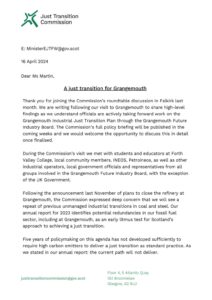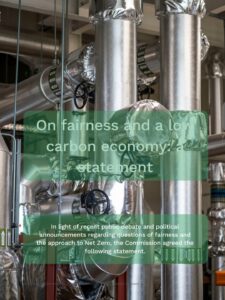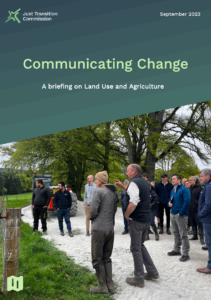To view the full content of the report, please download the PDF below.
A Just Transition for Grangemouth

Overview
This briefing is the first in a series of such publications recording key insights and findings developed through the Commission’s people- and place-based approach to engagement with those most likely to be impacted by the climate transition across Scotland. It includes a record of the Commission’s recent visit to Grangemouth, key findings and recommendations to policy-makers and others with decision-making power regarding the future of the town and its industrial site. The briefing is supported by research on workers’ perspectives on the closure of the refinery which has been published as a standalone here.
The challenge
Following the announcement last November of plans to close the refinery at Grangemouth, the Commission expressed deep concern that we will see a repeat of previous unmanaged industrial transitions in coal and steel. Our annual report for 2023 identifies potential redundancies in our fossil fuel sector, including at Grangemouth, as an early litmus test for Scotland’s approach to achieving a just transition.
Five years of policymaking on this agenda has not developed sufficiently to require high carbon emitters to deliver a just transition as standard practice. As we stated in our annual report: the current path will not deliver. The limitations of collective efforts to date are nowhere more clearly in evidence than at Grangemouth, which presents an acute challenge for applying a just transition approach, given the central role of a privately owned company and foreign state-owned enterprise, and the associated difficulties in setting conditions and implementing effective mechanisms for open dialogue about the site’s future.
A key generic question is how a just transition can be achieved in places where economic activity and employment is heavily linked to a single private employer. It is the Commission’s view that, provided efforts in this area are adequately resourced and approached as an urgent priority of national importance from now on, the Scottish Government and UK Government can each still play a positive role in reshaping Grangemouth’s economy, using their capacity and leverage strategically to support workers and community to experience a measure of justice through the transition.
Key messages
1. The just transition plan for Grangemouth must earn the trust of the workforce and the local community.
Clear, measurable and enforceable actions owned by each institution involved in the Grangemouth Future Industry Board should be expressly aimed at restoring the trust of the local community that a just transition approach will deliver where previous initiatives over recent years have fallen short. The strategy needs to be very clear in terms of the timescales associated with each action, so that the plan can provide specific reassurance for the short, medium and long term. To make the vision credible, the plan must set out how progress will be monitored and evaluated against specific metrics and indicators, supported by a robust critical path analysis that maps contingencies and takes seriously the possibility of failure or underperformance across key elements of the strategy proposed, including those associated with specific technologies, fuels and regulations (such as the cap on the use of Hydrotreated Esters and Fatty Acids (HEFA) for sustainable aviation fuel). By the end of Q3 2024, we expect to see a draft plan to be agreed through social dialogue with workers and meaningful participation of the community and other stakeholders. This will require a considerably more intensive sequence of meetings, including in-person, to support constructive dialogue, shared understanding and tangible new commitments. The value of the plan will depend on the level of assurance and security it provides to workers whose livelihoods are on the line, as well as to the local community in Grangemouth. The needs of workers and community around Finnart also needs to come into the scope of this plan, since the refinery’s closure could have a particularly severe impact here. Trust will not be re-established without enforceable outcomes against which progress can be measured.
2. The Grangemouth plan must be the first in a series of rapidly developed just transition plans for Scotland’s highest emitting sites
The Scottish Government should set out clear fair work and community involvement provisions for the closure of high carbon assets (clearly foreseeable given long term trends) and scale up of clean energy. A sign of the just transition is anticipating the inevitable phase out of fossil fuels in ways that involve workers and communities so that closure and greening is shaped in a socially positive way. The Scottish Government should now ensure that those with responsibility for each of the top 20 industrial emission sites in Scotland, including operations at Peterhead, Mossmorran, Dunbar, St Fergus, Markinch, Lockerbie, Shetland, Irvine, Alloa, Dalkeith, Stirling and Girvan, are required to consult, negotiate and publish a just transition plan to show how the social dimension of transition will be managed. This process should begin as a matter of urgency. We would underline the recommendation made by the first Just Transition Commission in its March 2021 report regarding planning for industrial emitters (see excerpt in Annex A).
3. A new intergenerational social contract is needed to safeguard local young people and their community’s future
Concern for the prospects and livelihoods of young people and future generations was the major theme across our engagement activities at Grangemouth. The retention of jobs and the local skills base on an intergenerational basis must be the core strategic aim of Grangemouth’s just transition plan, with concrete and measurable actions for delivery. As was clear from our discussions with educators and students at Forth Valley College, our colleges are of critical importance in achieving this, and their key strategic role needs to be reflected through greater levels of investment to truly maximise their value as a bulwark of just transition. Existing age restrictions on eligibility for modern apprenticeship funding should be widened as far as possible, given the obvious long-term strategic economic benefit of highly skilled people that we need across all sectors for this transition. Clear and measurable actions to guarantee access to high quality learning in STEM subjects will be crucial for Grangemouth’s young people, and the approach to careers advisement should be reviewed to ensure learners are not taught to privilege university education over college by default. Clear training and employment pathways are needed for all (not only young people) through the transition as green industries take root, with strategic alignment across the various employability and training programmes. This new social contract must also apply to those living within “the shadow of the complex” (as one resident put it to us) in the hazard consultation zone, enduring heavy traffic, dealing with emergencies and environmental risk and the continued lack of official lorry parks. More must be done by industrial owners and operators to mitigate the impact on residents and rebuild community relationships, by making significant investment in social, cultural and sporting infrastructure of the community to improve mental wellbeing and health outcomes.
4. Grangemouth needs a new economic model that goes well beyond the refinery, leveraged to deliver enduring community benefit
All public money/subsidy deployed to support the transition at Grangemouth must come with conditionalities linked to just transition, such as those ensuring fair work, community benefit, equity stakes, profit-sharing mechanisms, environmental needs (e.g. flood prevention). The refinery is an important industrial facility and source of livelihoods but it does not define the Grangemouth economy. Given the failure to date in avoiding a disorderly exit from oil refining, a strategic focus needs to be placed on the decarbonisation of the petrochemicals plant and the rest of the chemicals cluster both in terms of energy inputs and feedstocks. The social performance and potential of the Forth Greenport needs to be examined so that it delivers fair work, shares value with the community and achieves positive environmental impact. New businesses offering fair work should also be attracted, including social enterprises and community energy initiatives. The Just Transition Plan for Grangemouth needs to stress transformation and diversification, both in terms of sector and business model. It must show how the community living within the hazard consultation zone will meaningfully benefit. An investment plan for the Grangemouth ecosystem including public, private and social investment, ownership and stakes, and a smart use of public money tied to just transition outcomes and deploying equity, debt, guarantee and grant dimensions and attracting investment from Scotland’s citizen investors through ISAs and pension funds. The Scottish Government needs to develop a compelling case with limited fiscal resources to secure the right type of investment that will deliver long-term economic, social and environmental benefit. It also needs to negotiate more strategically with the UK to secure all-UK deals for nationally significant clusters such as Grangemouth and make sure that labour rights and human rights are at the heart of the UK equivalent to the EU’s CBAM for the import of all carbon intensive products (including oil, gas and petrochemicals). There must be no use of the Freeport initiative to undermine good job creation, local democracy, environmental standards and local tax raising powers.
5. The Commission will publish an assessment of progress towards a credible program of just transition planning and delivery for Grangemouth in our annual report in Q4 2024
Annexes
To view the Annexed content of the report, please follow the hyperlink or PDFs below.
Annex A: The Grangemouth Refinery Closure; Workers’ Perspectives
Annex B: Commission pre-visit briefing pack









